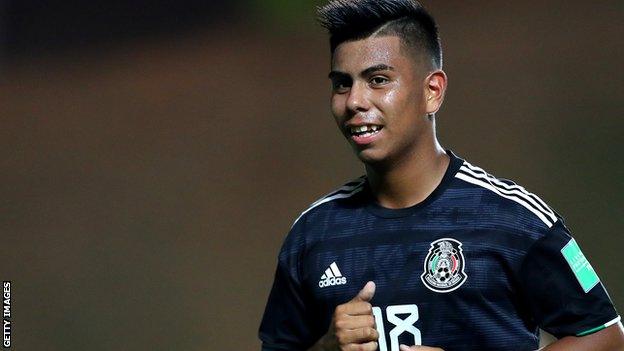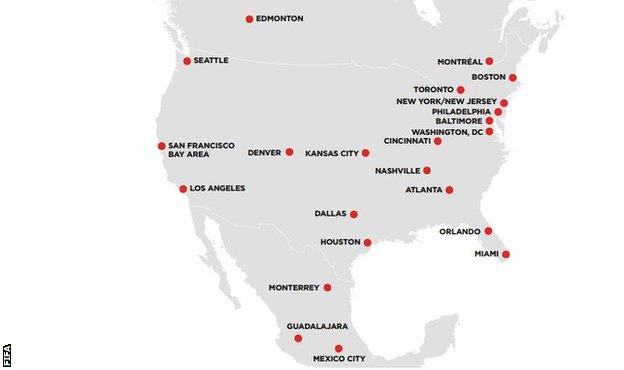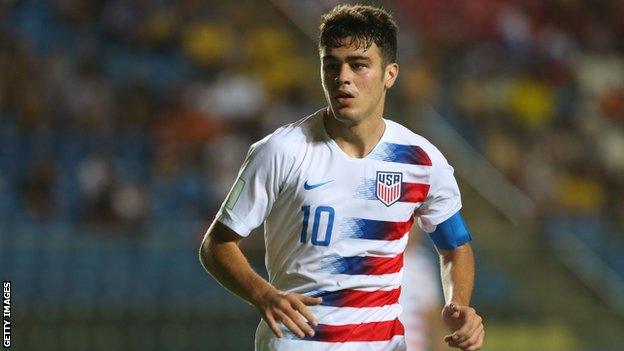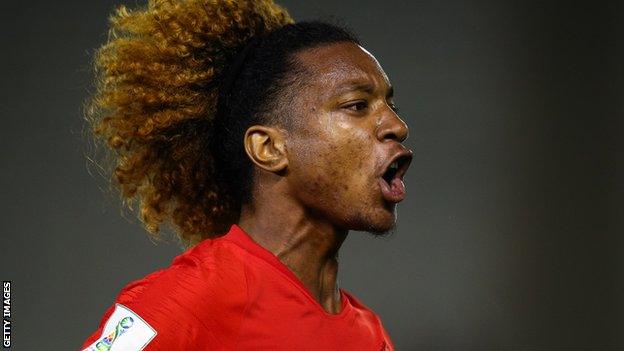World Cup 2026: Meet the future North American stars dreaming of success
- Published
- comments

At the Under-17 World Cup in Brazil this November, the US, Mexico and Canada took to the international stage - with thoughts already turning to the 2026 World Cup that will be hosted by the three nations.
Here, BBC Sport profiles three players - one from each country - who are already being described as future stars who could make their mark at the tournament.

Alvarez has a dog called Salah - named after the Liverpool forward
Efrain Alvarez (LA Galaxy & Mexico)
Date of birth: 19 June 2002
Position: Midfielder
Efrain Alvarez might just be the most coveted North American footballer since Freddy Adu. The 17-year-old LA Galaxy forward has been called "by far the biggest talent in the MLS" by none other than Zlatan Ibrahimovic., external It's little surprise then, that he's the subject of an international tug-of-war.
Born in California to immigrant parents from Mexico, 'Efra' grew up in east Los Angeles and joined the Galaxy Under-9s when he was seven years old. Even at that age he was attracting some very influential admirers.
One of his matches that season was watched by Eric Cantona. Legend has it the former Manchester United player - then director of football at New York Cosmos - was in town for a few under-17s and under-19s games. But it was Alvarez who caught his eye, with Cantona saying:, external "I've seen enough; I just want to watch this kid all day."
The Frenchman moved on but Alvarez progressed. For the under-14s, he scored a Cantona-esque lob, external for his 24th goal in 19 games, and when he turned professional by joining the Galaxy's second team aged 15 years and one month, he became the youngest signing in United Soccer League history, usurping Alphonso Davies, the Canadian now playing for Bayern Munich.
Alvarez is deployed mainly as a creative number 10 and has a left foot that can split defences in a second. He pairs it with an innate knack for finding the back of the net. The youngest player to hit a hat-trick in the USL Championship, he scored 12 goals for Galaxy II on the way to being named their 2018 Young Player of the Year. After making his first-team debut in March this year, he contributed three assists in 14 MLS appearances.
Ibrahimovic - who left Galaxy in November - has had nothing but praise for his protege.
"You see when he plays, he's all natural: the way he thinks, the way he moves the ball, the way he touches the ball," the Swedish striker told reporters in July, external. "He's by far the biggest talent in the MLS. He thinks football. He has that football in him, and it's natural."
Alvarez has always been regarded as the standout in a family that, he says, has "football in our blood". Two of his older siblings have played professionally, with brother Carlos now at Las Vegas Lights alongside, as fate would have it, a 28-year-old Adu - one player who did not quite live up to the billing he was given as a teenager.
Yet while everything is sweet at the Galaxy, at national team level there have been hiccups. Alvarez represented the USA for three years and even captained the country's under-15s at a youth tournament in Argentina, scoring a hat-trick en route to the title. Yet two months later, after a run of just one start in four games, he decided to ditch red, white and blue in favour of Mexican green.

The 23 potential World Cup 2026 venues in Canada, the United States and Mexico - 16 will be selected
"There were and still are no decisive factors, really," Alvarez tells BBC Sport when asked about his decision to switch. "It's just wherever I am happy. Right now, I'm happy with Mexico so, as long as I'm happy, it's going to be Mexico. But in the future you never know."
This November, Alvarez helped Mexico reach the final of the Under-17 World Cup - where they lost 2-1 to hosts Brazil.
Marco Ruiz, Mexico Under-17 coach, describes him as "very promising", "committed" and "important to me", yet despite being involved in more goals than any of his team-mates, Alvarez was also often the first player to be substituted. Boasting a thickset build reminiscent of a young Carlos Tevez, he does not share the Argentine's tireless running and completed 90 minutes just once in Brazil.
"I have talked to him about dynamics," Ruiz adds. "He needs to be a little bit more dynamic; if he moves a little faster, he will find better spaces to take advantage of all his talent."
Alvarez's World Cup campaign in a microcosm came in the semi-final against the Netherlands. Starting on the bench, he was introduced in the 73rd minute, equalised in the 79th, then in the shoot-out struck a horrible 'Panenka' penalty that was easily saved. Mexico still went through, and afterwards he suggested - in a very Zlatan-like way - that he would do it again: "Most do not dare. I dared."
Somewhat enigmatically, Alvarez says he does not remember where he was when he learned North America will host the 2026 World Cup. Nor is he willing to gaze too far into the future. "I obviously want to go to every World Cup I can, every tournament, every game," he says. "I don't want to miss one game. But I take everything day by day, I don't like to look too far forward."

Giovanni Reyna (Borussia Dortmund & USA)
Date of birth: 13 November 2002
Position: Forward

Reyna has been playing in the U19 Bundesliga this season
The United States disappointed in Brazil, exiting the group stage following heavy defeats by Senegal and the Netherlands and a 0-0 draw with Japan. If their much-hyped forward Giovanni Reyna is seeking solace, he need not look too far from home.
Reyna's father Claudio - who played for Rangers, Sunderland and Manchester City - crashed out of the same tournament in 1989 before going on to captain the USA at the 2002 and 2006 World Cups. Similarly, current US skipper Christian Pulisic failed to reach the knock-outs in 2015 yet is now setting the Premier League alight with Chelsea following a move from Borussia Dortmund.
'Gio' Reyna may then process the pain of the past month as a positive, as a rite of passage that all successful American soccer players must go through. Named after Giovanni van Bronckhorst, his dad's former team-mate at Rangers, perhaps the hardest thing to accept will be that, arguably for the first time in his fledgling career, he was not the standout performer among players his own age.
Reyna was born in England and has been regarded as the jewel of his generation for more than a decade. Comparisons with America's soccer sweetheart Pulisic were perhaps inevitable, but they sharpened this summer when, aged 16, Reyna signed for Dortmund after gaining a Portuguese passport through his paternal grandmother, Maria. The German club's assistant manager, Jorg Heinrich, says Reyna is "similar… or maybe a little bit better" than 21-year-old Pulisic.
Such talk does not faze a teenager who has been encircled by expectation since his days dominating at Under-9 level aged five years old. Now 6ft 1in, he has an assertive presence on the field, can read a game well and is at his best when driving at pace towards defenders. He carries the ball quickly, but in a style closer to one of his favourite players, Kaka, than his compatriot Pulisic.
"Of course, it's nice to be compared to Christian because he's the best American player right now, but really I would like to create my own path," Reyna, who exchanges messages with Pulisic, tells BBC Sport.
"It's good to have someone only a few years older than me that I can look up to. We have similarities, but we are very different players, so I think some years down the line we can make a good duo."
Three countries react to getting the World Cup 2026 bid
During Under-17 World Cup qualifying Reyna scored six times in six games, and in Brazil he wore the captain's armband despite being the third-youngest player in the squad. "Gio is one of the best players I've ever coached in this age group," says his US manager Raphael Wicky. "He's a special player; a lot of technical ability. He can make a difference."
At just 17, there are obvious areas to improve. In the 4-1 loss to Senegal, Reyna failed to find a way to impose himself on the game, and after the 4-0 defeat by the Netherlands his reluctance to press was highlighted by the Dutch coach as a reason for the comfortable scoreline. Wicky, however, believes his young captain is now in the perfect place to learn.
"Gio has made the big step up and at Dortmund there is no red carpet," says Wicky, a former Switzerland defensive midfielder who spent 10 years playing in the Bundesliga. "You have to prove yourself every day. If you don't, someone else will take your place. Gio has a lot of the qualities that a player needs, but football is not only attacking; it's defending, commitment, mentality. That's something he'll learn at a top club in Germany. And if he learns that, 100% he will be there at the World Cup in 2026."
For now at least, Brazil appears to be a mere bump in the road. In July, Reyna made his first start for Dortmund in a pre-season friendly against Liverpool and two months later coach Lucien Favre included him in his Champions League squad. No surprise then, that seven years seems like too long a wait.
"Of course 2026 is there, but for me, my goal is to be at the next World Cup," he says. "I'll be 19 by then and I think, all going to plan, I am more than capable of making it."

Jayden Nelson (Canada & Toronto FC II)
Date of birth: 26 September 2002
Position: Forward

Nelson was nicknamed 'The Canadian Valderrama' by fans
There is a joke among the parents of Canada Under-17 players that the only thing bigger than Jayden Nelson's afro is his potential. Born in Toronto but raised about 30 miles to the west in the suburban city of Brampton, he started out at the same club as Cardiff City's Junior Hoilett, Brampton YSC.
A fearless winger with electric feet and an eye for goal, Nelson was playing for Canada Under-12s by the age of nine and within two years had been picked to join the academy of MLS outfit Toronto FC. On his reserve-team debut in April aged 16, he created three clear-cut chances in an eight-minute cameo. He has also since trained with the first team.
"Jayden's strengths are in his ability to take people on, but what compelled us to put him in a professional environment was the confidence he has," says Michael Rabasca, the Toronto reserve team coach who has since used Nelson in a further 13 games. "He has developed a confidence that enables him to succeed and perform each and every week."
Again, playing at the Under-17 World Cup in Brazil held particular significance. Nelson grew up studying videos of Ronaldinho and the way he runs is more than a little similar: right foot repeatedly kissing the ball, silky body feints and stepovers. "I like how he took players on and how his motto was always to play free," he says of the former Barcelona star. "It's something I try to implement in my game too."
Nelson - who is also eligible to represent Jamaica - netted five times, including a hat-trick against Guatemala, to help secure Canada's place at November's tournament. Yet with his country having never won a World Cup game at six previous Under-17 competitions, he was always unlikely to prove more than a tournament footnote. Three defeats sent Canada home after a week, but if one player did not deserve to be on the losing side in a cruel 1-0 defeat by New Zealand, it was the big-haired number 11 who fans nicknamed 'The Canadian Valderrama'.
Nelson proved a tireless menace as Canada dominated possession. He had a goal chalked off by the video assistant referee and his constant dribbling was appreciated by the vocal Brazilian crowd, if not always by his coaches. There is, after all, a fine line between self-assurance and selfishness. "When you are facing four or five guys, it's probably not the best time to go it alone," says Rabasca. "Jayden has his strengths, but now he needs to learn how to incorporate his talent to the benefit of the team."
For his part, Nelson - consistently described as humble and respectful by those who know him best - is aware his decision-making must improve if he is to realise his dream. "Honestly, since I can remember, I've always wanted to be a professional soccer player," he says. "I knew I played for fun, but also knew I could go far because of the comments I was getting.
"Going forward, I'm going to be playing with older, smarter and bigger players, so I need to know when to dribble and when to pass. If I train more, work harder and stay humble though, I like to think 2026 is a realistic goal."